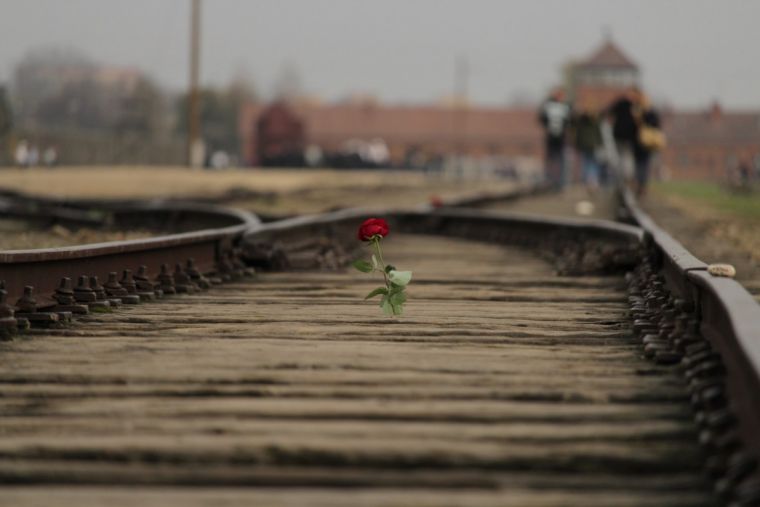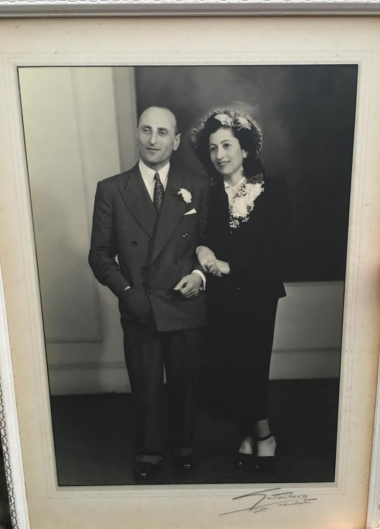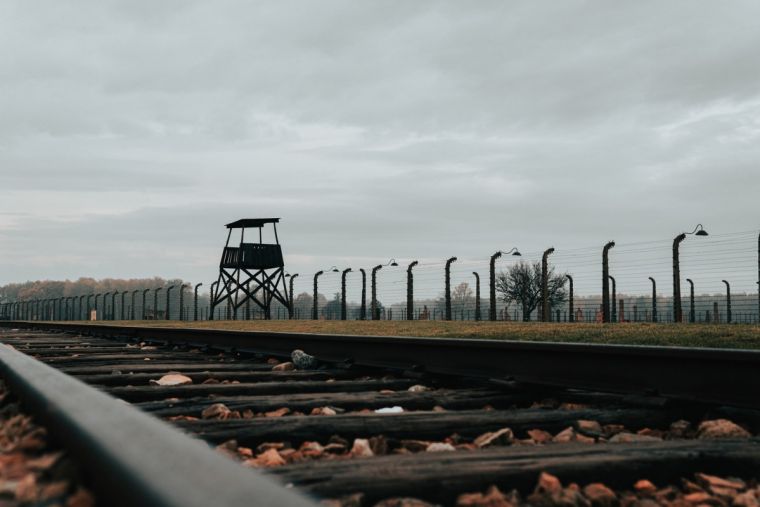Millions of Jewish families like mine were nearly wiped out by the Holocaust and the pain is as real today as it was then

I am a member of the second generation of Holocaust survivors and for this reason, to mark the 75th anniversary of the liberation of Auschwitz concentration camp, Christian Today have asked me to share my parents' stories. I would like to say at the outset that I have never done this before, except for a brief retelling to my granddaughter, Alma, aged nine, as part of the general Israeli school curriculum on stories of grandparents and great-grandparents.
I wasn't prepared for it then, when my son-in-law skyped me out of the blue from the central north region of Israel and said 'Alma wants to talk to you.' Alma looked grave and expectant as she put all her questions to me, the 'oracle' who in all honesty wishes she knew more.
My uncle, Arthur, who reminds me of Elie Wiesel - who I met once in my life - was one of the tiny remnant of over a million people who survived Auschwitz, but adding to the tragedy, this country wouldn't let him in, this being in spite of Poland's complicity in the Holocaust.
So this is a tale of death, complicity and, worst of all, the breaking up of families, for which this country should ever and eternally hang its head in shame.
In setting down the stories of my Mum and Dad, I am relying on information given me piecemeal throughout my childhood and young adulthood. In addition, and where possible, I have also checked the facts that I could from external sources.
My Mum had a brother and sister who survived the Holocaust in Siberian labour camps, together with my grandfather, who lived until I was one-year- old, passing away in 1952 aged 81. My maternal grandmother, Cornelia, died during the War – whether through illness or murder my brother and I were never informed, and we didn't want to push it.
My mother, Shulamit, was probably born on September 20, 1919. I say 'probably' because she wasn't certain of this and no papers survived her post-War arrival in England in 1949. But she was the second of three children of my grandfather's second wife, the first having died, also leaving children - we have no record of what happened to this first family.
Unlike Mum, who was allowed into this country because of Dad's story (which I will explain below), her brother Bronek and sister Helen were not allowed to join her here after the War, even though Helen's husband, Arthur, had miraculously managed to survive Auschwitz, and Helen was an accountant who wouldn't have been a burden on anyone. Helen eventually emigrated to Australia with Arthur and lived in Melbourne.
Bronek had been a lawyer in Poland, but, being refused permission to settle with his remaining family here in the UK, he had no choice but to return to Poland after the war, until he was thrown out as a 'Zionist' with all remaining Jews after the crop failure of 1969-70. Even then, the UK prevented Bronek from joining his family here, so he accepted an invitation to settle in Sweden. I visited him in Stockholm in the summer of 1970, where he was working as a translator and finding it extremely difficult to acclimatize to Swedish society. We managed to communicate only through German, which neither of us liked doing, but sometimes needs must.
Mum didn't tell me much about her childhood. What I do know is that she was born in Jasło, a small town in the Krakow district, at the south-eastern tip of Poland, near to former Czechoslovakia, Ukraine, Romania, Hungary and Austria. By WWII, the Jewish population of her home town was 3,400, 22% of the total, which at its peak was 16,000 inhabitants. The Jewish community lived in two areas of the town, the poorer area being mainly Yiddish speaking and the better-educated area speaking Polish.
Mum was the best linguist I have ever met, knowing at least 10 modern languages, including Polish, Romanian, Czech, Russian, German, Yiddish, modern Hebrew (which she had to learn secretly, as it was against the law), and later English, Spanish and even Catalan, when she spent some of the year with Dad in Majorca. Mum also knew Greek and Latin, as well as some Biblical Hebrew. But the love of Mum's life was French in all its aspects. And, as you will see, this love of French saved Mum's life.

Mum told me that her school was mixed Catholic and Jewish. She particularly liked the geography teacher and drew lovely maps for him, but he turned out to be extraordinarily anti-Semitic, so she curtailed her map drawing and lost interest.
My grandfather was a timber merchant, a common occupation for Jews of that area – Israeli statesman Chaim Weizmann's father had a similar job. Mum told me that her Dad went up and down in his observance of Judaism, but he was obviously quite a character. She told me once that the Catholics in Poland at the time tended to hate the Jews and that at Easter all Jewish inhabitants would stay in the house, as pogroms were prevalent at this time, with rapes, burnings, and lootings being common.
It appears that in 1938, Mum enrolled as a student of French, the love of her life, at university in Krakow. Much later in life, she told me that in fact she had wanted to be a doctor, but as a Jew was not allowed to study medicine. Mum possessed an almost fanatical attention to detail, something that makes me think she would have made a splendid surgeon – what a loss to this country and the National Health Service the antisemitism in Poland proved to be.
According to Mum's account, though, in 1939 the University of Krakow was forced to flee to Paris and she ended up studying French at the Sorbonne. The War intervened and she never finished her studies. Together with her new best friend, the Parisian Francine, she became very interested in garden cities, as Francine's father had been the French pioneer in this field. But both of them had to flee because the Germans took over and the first Jews to be deported by the French to concentration camps were Jews of Polish origin, not that French-born Jews were safe either.
With this turn of events, Mum fled to the Nice area in the south of France, which was occupied by the Italians (who at that time were on the German side). They turned a blind eye to people who may or may not have been Jewish and simply imprisoned Mum with her lawyer for a time.
By this time, Mum had changed her name to 'Paulette', which is what we always called her. And she also took on a French persona. As 'Paulette', Mum made herself indispensable to a would-be Parisian actress, testing her on her lines, correcting her French intonation, and sewing all her clothes. The actress had a brother who was in the Parisian police and he told my Mum to stay with him at all times when the Gestapo approached. She was not to say a word and he would pass her off as his girlfriend. So this is what Mum did, and this policeman saved her life at risk to his own.
Later in Nice, others would also save her life, and she sewed for them too. The code for anyone suspicious approaching was 'les choux-fleurs sont arrivés' – 'the cauliflowers have arrived.' And Mum would then get on her bike and cycle to the next safe house.
France taught Mum a great deal – how to cook, how to enjoy yourself in the gravest of dangers – and that the world, although awful, wasn't all bad and that there were also heroic people around even in the worst of circumstances. It also helped that Mum was a stunner, although she never ever boasted. She was a very circumspect person who kept her thoughts and feelings to herself, except when once she burst out in public during our childhood that 'the Catholic Church is the worst thing on earth – they have all those riches and starve their own populations', and then she went quietly back to her sewing, which she did religiously every day, first thing in the morning.
My Dad, Max, one of three brothers, the others called Charles, the eldest (after whom my brother is named) and Paul. He was born on June 29, 1912, in Warsaw, the largest Jewish city in the world, where Jews had for centuries played a prominent role. Around 30% of the city's population was Jewish, at 350,000 out of around 1.3 million. Dad had miraculously managed to overcome the numerus clausus in operation, in order to study law at Warsaw University, becoming a judge in his 20s. Dad was also a member of the Polish reserve table tennis team, so very well integrated, while retaining his Jewish identity. He was also an expert swimmer and life-saver, the River Vistula being his favourite practice ground.
But in 1938, Dad saw the writing on the wall and left Warsaw for Vilna in Lithuania. A remarkable correspondence ensued in Polish between my Dad and his mother, Regina, after whom I am named, revealing his concerns about my grandmother's health (it seems as if my grandfather had already died).
The main characters during this period were Dad, Grandma and elder brother Charles, who had recently opened a medical practice in Warsaw and got married, as if war were not raging around him.
All letters from Vilna to Warsaw were censored and contain Nazi insignia. But reading between the lines, it appears that Dad, aged 26 and on his own in Vilna, was keen to remind his mother of World War One. Despite being only two when the First World War broke out, he poignantly wrote: 'Don't worry, Mum. Do you remember when I used to tell you that the previous war would finish. This war too will be finished soon and then I will come home and we will all be together again.'
It was not to be as Dad was to be the sole survivor of his family. Uncle Charles, his new wife, Irene (after whom I'm also named), uncle Paul and everyone else on that side of my family were massacred by fellow Poles in a round-up, while Grandma Regina was herded into the Warsaw Ghetto and then transported to Treblinka extermination camp, where she was exterminated.
During this time, together with his Warsaw friend Martin Glass, Dad trekked from Vilna through Russia to Siberia, reaching Vladivostok, from where they sailed to Japan (Dad said it was the only time he was sea-sick). This was before Japan had entered the War with Pearl Harbour and he recalled being treated well there. From there, they then went on to Canada, a country dad loved and would have stayed in had it not been for his desire to get back to Europe to save Grandma Regina from the Warsaw Ghetto. With that in mind, he joined the Scottish regiment, the Black Watch, while in Canada and returned with his new battalion to Scotland. In the end, Dad tried in vain to find out about Grandma Regina.
After moving to Scotland, Jewish Poles had to join the Polish army there and he recalled being treated very badly. He was one of a delegation of Jews who protested to Parliament about their treatment at the hands of the Polish army, and the late Labour MP Tom Driberg MP took up their case.
This was all during the War, when Poland was supposed to be on the side of the Allies, but many Polish people actually played a very large part (together with many Lithuanians, Latvians and Ukranians, of course) in the mass murder of Jews who had lived among them for hundreds of years, and in some cases, as with the case of Germany, had predated Christianity in those east European countries.
But happier times awaited after the War when Dad moved from Scotland to London and stayed with distant relatives who had emigrated from Poland at the beginning of the 20th century. The brother of one of these relatives, uncle Shimek, was a doctor in Paris and in 1949, he met Mum wandering the streets and immediately thought that she and Dad would hit it off. So Mum was invited to the Pesach Seder in London in 1949, not even knowing any English and they hit it off fine, marrying very soon after that.

Now a shipping clerk, Dad had been sent to Manchester on business and saw an opening in check linings for raincoats, which is why Mum and Dad settled with absolutely nothing in Prestwich, Manchester, in a house just round the corner from where I now live, albeit moving out of the 1950s smog to sunny Southport on the sea when I was two years old and my brother a baby. But that is another story.
What I make from these remarkable tales of resilience, brilliance and sheer miracle survivals, when 90% of the entire three million Jewish inhabitants of Poland were exterminated by German people and their Polish accomplices, is just how unique and special my parents were. My Mum was a linguistic genius and also a rare beauty, although she devoted her life to her husband and to her children. She was treated shamefully by the already-established Anglo-Jewish communities of Manchester and Southport, but ignored them all, and didn't even mind when I showed an interest in religion myself, and specifically in the Jewish religion of which the Anglo variety is often not a very fine specimen.
Dad had the most marvellous sense of humour, loved Latin and the outdoors and taught me to swim in the sea aged two, even though he would have preferred to remain in Manchester with his Polish Jewish friends. Like Mum, Dad was also a stickler for facts: world capitals, kings and queens, naming the planets, and exploring all these themes in long walks with me on the Southport dunes were all a delight to him. At the dinner table afterwards, when the whole family would join in.
Dad taught my Mum how to play bridge and then she surpassed him, becoming a world champion. In fact, they both became teachers of bridge. In later life Mum and Dad learned not only Spanish, but Catalan, in order to converse with their neighbours in Majorca, where they spent much of the year for health reasons.
It is a great pity therefore that Mum and Dad died before their time, Dad being 65 when he passed away and Mum 70. But they always looked ahead and never wallowed in bitterness or regret, although they rightly saw the Holocaust for what it was – the deliberate, systematic and scientifically planned and executed extermination of an entire people and religion by Nazi efficiency, enabled by a Church that by and large didn't speak out when it should have done, with 'Christians' in many cases turning a blind eye or even being co-perpetrators in the discrimination or atrocities, to the Church's immense and enduring shame.
But Germany did at least pay Mum reparations for the rest of her life. Poland and other eastern European countries, the latest being Lithuania (where 96% of Jews were exterminated), are still living in denial by pretending that they were heroic, when in fact many Poles were knowingly and actively involved in the murders of my Dad's entire family.
This is why the Poles refused to send anyone to the 75th anniversary of the liberation of Auschwitz at Yad Vashem in Jerusalem. Jewish blood is on their hands, for it has rightly been said in the Book of Ovadiah: "On the day you stood aloof you were like one of them."
In fact, many Poles didn't stand aloof but actively participated in the mass murder of their Jewish brethren and neighbours of centuries: doctors, lawyers, teachers, chemists and psychotherapists, with alacrity. And among these were my grandmother, aunts, uncles and cousins who I never had the chance to get to know.
And when my uncle and his family on the other side of the family returned from labour camps in Siberia to their home country once again, having been refused permission to join their remaining family here in the UK, plucky little Poland threw them out once again.
Luckily though, my mother and father managed to survive, and for that - and my own children and grandchildren, all now living in the State of Israel, their little home on earth - I am grateful.
Dr Irene Lancaster is a Jewish academic, author and translator who has established university courses on Jewish history, Jewish studies and the Hebrew Bible. She trained as a teacher in modern Languages and Religious Education.











